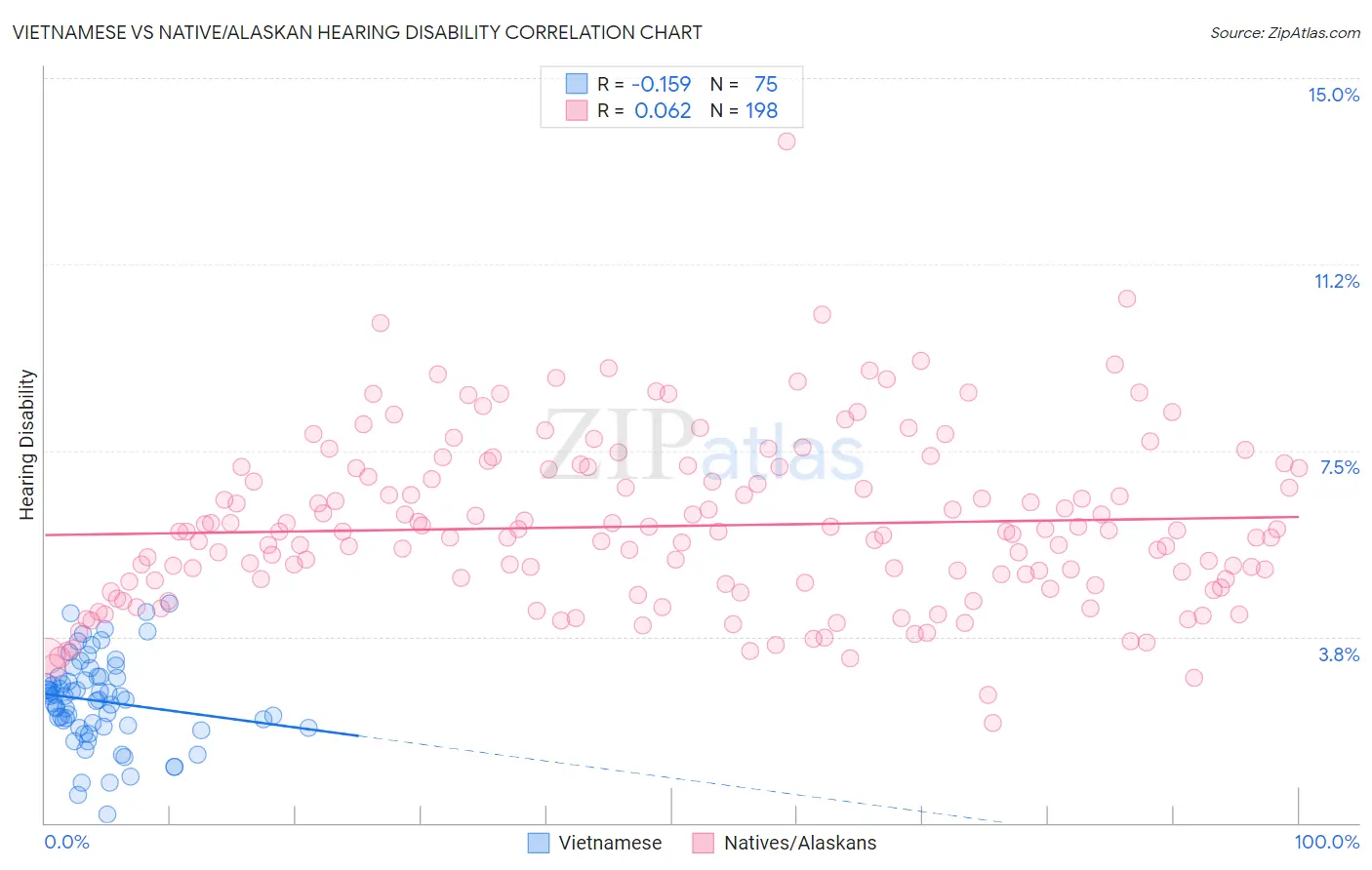Vietnamese vs Native/Alaskan Hearing Disability
COMPARE
Vietnamese
Native/Alaskan
Hearing Disability
Hearing Disability Comparison
Vietnamese
Natives/Alaskans
2.4%
HEARING DISABILITY
100.0/ 100
METRIC RATING
6th/ 347
METRIC RANK
4.2%
HEARING DISABILITY
0.0/ 100
METRIC RATING
330th/ 347
METRIC RANK
Vietnamese vs Native/Alaskan Hearing Disability Correlation Chart
The statistical analysis conducted on geographies consisting of 170,714,585 people shows a poor negative correlation between the proportion of Vietnamese and percentage of population with hearing disability in the United States with a correlation coefficient (R) of -0.159 and weighted average of 2.4%. Similarly, the statistical analysis conducted on geographies consisting of 512,663,343 people shows a slight positive correlation between the proportion of Natives/Alaskans and percentage of population with hearing disability in the United States with a correlation coefficient (R) of 0.062 and weighted average of 4.2%, a difference of 75.8%.

Hearing Disability Correlation Summary
| Measurement | Vietnamese | Native/Alaskan |
| Minimum | 0.18% | 2.0% |
| Maximum | 4.4% | 13.7% |
| Range | 4.2% | 11.7% |
| Mean | 2.5% | 6.0% |
| Median | 2.6% | 5.9% |
| Interquartile 25% (IQ1) | 1.9% | 4.8% |
| Interquartile 75% (IQ3) | 2.9% | 7.2% |
| Interquartile Range (IQR) | 0.99% | 2.3% |
| Standard Deviation (Sample) | 0.87% | 1.7% |
| Standard Deviation (Population) | 0.87% | 1.7% |
Similar Demographics by Hearing Disability
Demographics Similar to Vietnamese by Hearing Disability
In terms of hearing disability, the demographic groups most similar to Vietnamese are Immigrants from Barbados (2.4%, a difference of 1.1%), Immigrants from Bangladesh (2.4%, a difference of 1.6%), British West Indian (2.4%, a difference of 1.8%), Immigrants from Dominican Republic (2.4%, a difference of 2.6%), and Immigrants from Guyana (2.3%, a difference of 3.0%).
| Demographics | Rating | Rank | Hearing Disability |
| Immigrants | Grenada | 100.0 /100 | #1 | Exceptional 2.2% |
| Immigrants | St. Vincent and the Grenadines | 100.0 /100 | #2 | Exceptional 2.3% |
| Guyanese | 100.0 /100 | #3 | Exceptional 2.3% |
| Immigrants | Guyana | 100.0 /100 | #4 | Exceptional 2.3% |
| Immigrants | Barbados | 100.0 /100 | #5 | Exceptional 2.4% |
| Vietnamese | 100.0 /100 | #6 | Exceptional 2.4% |
| Immigrants | Bangladesh | 100.0 /100 | #7 | Exceptional 2.4% |
| British West Indians | 100.0 /100 | #8 | Exceptional 2.4% |
| Immigrants | Dominican Republic | 100.0 /100 | #9 | Exceptional 2.4% |
| Immigrants | Ecuador | 99.9 /100 | #10 | Exceptional 2.5% |
| Immigrants | Trinidad and Tobago | 99.9 /100 | #11 | Exceptional 2.5% |
| Trinidadians and Tobagonians | 99.9 /100 | #12 | Exceptional 2.5% |
| Sierra Leoneans | 99.9 /100 | #13 | Exceptional 2.5% |
| Ecuadorians | 99.9 /100 | #14 | Exceptional 2.5% |
| Barbadians | 99.9 /100 | #15 | Exceptional 2.5% |
Demographics Similar to Natives/Alaskans by Hearing Disability
In terms of hearing disability, the demographic groups most similar to Natives/Alaskans are Cherokee (4.2%, a difference of 0.15%), Crow (4.2%, a difference of 0.79%), Tohono O'odham (4.2%, a difference of 0.80%), Houma (4.2%, a difference of 0.83%), and Arapaho (4.1%, a difference of 1.2%).
| Demographics | Rating | Rank | Hearing Disability |
| Apache | 0.0 /100 | #323 | Tragic 4.1% |
| Osage | 0.0 /100 | #324 | Tragic 4.1% |
| Lumbee | 0.0 /100 | #325 | Tragic 4.1% |
| Potawatomi | 0.0 /100 | #326 | Tragic 4.1% |
| Arapaho | 0.0 /100 | #327 | Tragic 4.1% |
| Tohono O'odham | 0.0 /100 | #328 | Tragic 4.2% |
| Crow | 0.0 /100 | #329 | Tragic 4.2% |
| Natives/Alaskans | 0.0 /100 | #330 | Tragic 4.2% |
| Cherokee | 0.0 /100 | #331 | Tragic 4.2% |
| Houma | 0.0 /100 | #332 | Tragic 4.2% |
| Dutch West Indians | 0.0 /100 | #333 | Tragic 4.3% |
| Aleuts | 0.0 /100 | #334 | Tragic 4.3% |
| Kiowa | 0.0 /100 | #335 | Tragic 4.3% |
| Creek | 0.0 /100 | #336 | Tragic 4.4% |
| Chickasaw | 0.0 /100 | #337 | Tragic 4.5% |